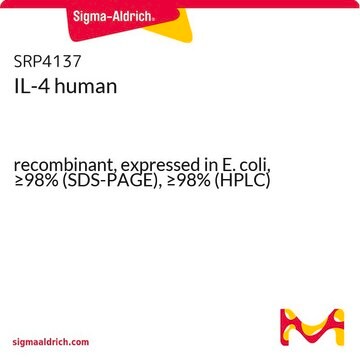SRP3287
IL-34 human
recombinant, expressed in HEK 293 cells, ≥95% (SDS-PAGE), ≥95% (HPLC)
Synonym(s):
C16orf77
Sign Into View Organizational & Contract Pricing
All Photos(1)
About This Item
UNSPSC Code:
12352202
NACRES:
NA.32
Recommended Products
biological source
human
recombinant
expressed in HEK 293 cells
Assay
≥95% (HPLC)
≥95% (SDS-PAGE)
form
lyophilized
mol wt
52.5 kDa
packaging
pkg of 10 μg
impurities
<0.1 EU/μg endotoxin, tested
UniProt accession no.
shipped in
wet ice
storage temp.
−20°C
Gene Information
human ... IL34(146433)
General description
IL-34 is a ligand for colony-stimulating factor-1 receptor (CSF1R), which also binds to CSF-1. It specifically binds CD14+ monocytes, promotes survival and proliferation of human peripheral blood monocytes, and stimulates macrophage colony formation by human bone marrow cells. IL-34, like human CSF-1 stimulates phosphorylation of MAPK1/ERK2 and MAPK3/ERK1.
Biochem/physiol Actions
IL-34 is a homodimeric cytokine that is expressed in a range of tissues including spleen, heart, brain, liver, kidney, lung, ovary, thymus, testis, small intestine, prostate and colon. Recombinant human IL-34 is a 52.5 kDa homodimeric glycoprotein consisting of 460 amino acid residues, including a C-terminal His-Tag.
Physical form
Lyophilized from 20 mM Sodium Citrate, pH 3.0 + 75 mM NaCl.
Reconstitution
Centrifuge the vial prior to opening. Reconstitute in water to a concentration of 0.1-1.0 mg/mL. Do not vortex. This solution can be stored at 2-8°C for up to 1 week. For extended storage, it is recommended to further dilute in a buffer containing a carrier protein (example 0.1% BSA) and store in working aliquots at -20°C to -80°C.
Signal Word
Warning
Hazard Statements
Precautionary Statements
Hazard Classifications
Eye Irrit. 2 - STOT SE 3
Target Organs
Respiratory system
Storage Class Code
10 - Combustible liquids
WGK
WGK 1
Flash Point(F)
Not applicable
Flash Point(C)
Not applicable
Certificates of Analysis (COA)
Search for Certificates of Analysis (COA) by entering the products Lot/Batch Number. Lot and Batch Numbers can be found on a product’s label following the words ‘Lot’ or ‘Batch’.
Already Own This Product?
Find documentation for the products that you have recently purchased in the Document Library.
Editorial: Leishmania survival mechanisms: the role of host phosphatases.
Marina Tiemi Shio et al.
Journal of leukocyte biology, 88(1), 1-3 (2010-07-02)
Alaa Sawaied et al.
International journal of molecular sciences, 21(21) (2020-11-05)
Spermatogenesis is the process of spermatogonial stem cell (SSC) proliferation and differentiation to generate sperm. This process is regulated by cell-cell interactions between Sertoli cells and developing SSCs by autocrine/paracrine and endocrine factors. It is also affected by cells in
Eleonora Franzè et al.
Journal of Crohn's & colitis, 10(1), 87-94 (2015-10-10)
Production of chemokines by intestinal epithelial cells is a key step in the amplification of the destructive immune-inflammatory response in patients with inflammatory bowel diseases [IBD]. In this study, we examined whether intestinal epithelial cells express macrophage colony-stimulating factor receptor
Xue Lin et al.
Critical care medicine, 46(6), e584-e590 (2018-02-01)
Sepsis is a devastating condition with a high mortality rate and limited treatments. Sepsis is characterized by a failed host immune response to contain the infection, resulting in organ dysfunction. Interleukin-34 is new cytokine involved in infection and immunity. Whether
Eleonora Franzè et al.
Clinical science (London, England : 1979), 129(3), 271-280 (2015-03-25)
IBD (inflammatory bowel disease)-related tissue damage occurs in areas which are massively infiltrated with monocytes/macrophages. These cells respond to inflammatory stimuli with enhanced production of cytokines/chemokines. In the present study, we analysed the expression and role of IL (interleukin)-34, a
Our team of scientists has experience in all areas of research including Life Science, Material Science, Chemical Synthesis, Chromatography, Analytical and many others.
Contact Technical Service






